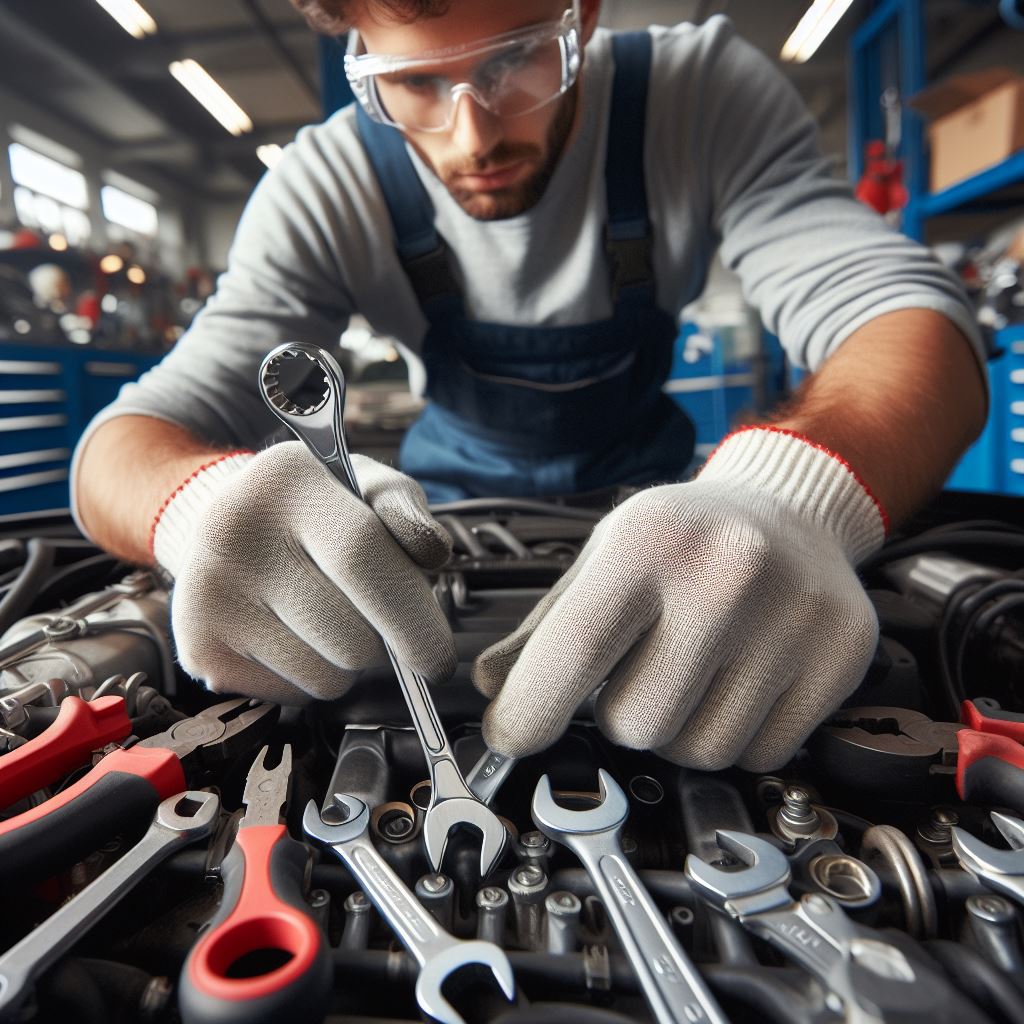Introduction
In the field of UK mechanics, essential soft skills are just as important as technical skills.
Soft skills enhance communication, collaboration, and customer service.
Navigating the realm of UK mechanics requires more than just mechanical acumen; it demands a nuanced understanding of customer interactions, teamwork, and adaptability.
As vehicles become more technologically advanced, mechanics must not only diagnose and fix issues but also effectively communicate complex problems to clients.
The ability to collaborate seamlessly within a workshop environment and adapt to evolving industry trends is equally crucial.
This comprehensive guide is designed to shed light on the indispensable soft skills that set outstanding mechanics apart.
From effective communication and customer service to teamwork and adaptability, each skill plays a pivotal role in shaping a mechanic’s professional journey.
Whether you’re a seasoned professional looking to refine your interpersonal skills or an aspiring mechanic eager to understand the holistic requirements of the trade, this exploration of essential soft skills promises to be an invaluable resource in the dynamic world of UK mechanics.
Communication Skills
In order to excel in the field of mechanical engineering, possessing strong soft skills is just as important as technical expertise.
While technical skills are crucial for a mechanic, it is the soft skills that enable them to effectively communicate, collaborate, and satisfy customer needs.
In this section, we will explore the significance of communication skills in the role of a UK mechanic.
Effective verbal and written communication
A mechanic should be able to convey information clearly and concisely, both in person and in writing, to clients and colleagues.
Ability to explain technical concepts to customers in a clear and understandable manner
Mechanics often have to interact with customers who may not have a technical background.
Therefore, they should be capable of simplifying complex concepts and explaining them in a way that clients can comprehend.
Active listening skills to understand customer concerns and requirements
Being an attentive listener allows mechanics to fully grasp the issues faced by customers, ensuring that their needs are met efficiently and accurately.
Personalized UK Career Consulting
Receive tailored career guidance designed just for you. Get actionable steps and expert support to boost your career in 1-3 days. Take control of your career now.
Get StartedInteracting and collaborating with colleagues and suppliers
Collaboration is essential in the mechanics’ work environment, as they frequently need to coordinate with other professionals, such as colleagues and suppliers.
Good communication skills foster effective teamwork and enhance productivity.
By honing their communication skills, mechanics can build trust and credibility with customers, promote a positive work environment, and increase customer satisfaction.
Effective verbal and written communication allows clients to fully understand the services provided by the mechanic, ensuring clear expectations and avoiding any misunderstandings.
Moreover, the ability to explain technical concepts in simple terms is particularly relevant in the UK, where customers highly value transparency and prefer to be actively involved in decision-making processes.
By being able to convey technical information clearly, mechanics can empower customers to make informed decisions about repairs and upgrades.
Active listening skills are equally vital because they enable mechanics to better understand customers’ concerns and requirements.
By carefully listening to clients, mechanics can gather all necessary details, provide accurate diagnoses, and recommend appropriate solutions, thus ensuring customer satisfaction and loyalty.
Furthermore, effective communication fosters a collaborative atmosphere among mechanics, colleagues, and suppliers.
By clearly articulating their own ideas and actively listening to others’ perspectives, mechanics can contribute to effective problem-solving and innovation.
This collaboration not only enhances mechanical performance but also improves the overall efficiency of the workshop or garage.
In fact, strong communication skills lay the foundation for success in the field of mechanics in the UK.
Mechanics who possess effective verbal and written communication skills, the ability to explain technical concepts clearly, active listening skills, and the capacity to interact and collaborate with colleagues and suppliers are highly sought after in the industry.
By prioritizing the development of these essential soft skills, mechanics can thrive in their profession, deliver exceptional customer service, and contribute towards the growth of the UK automotive sector.
Your Dream Job Starts with a Perfect CV
Get a tailored CV and cover letter that captures your unique strengths and stands out in your industry. Let us help you make an unforgettable first impression.
Get StartedCustomer Service Skills
Customer service skills are crucial for mechanics in the UK to provide exceptional service and foster positive relationships with their customers.
These skills are essential in ensuring customer satisfaction and loyalty.
1. Providing Excellent Customer Service
- Building relationships with customers by delivering exceptional service and going the extra mile.
- Showcasing professionalism and expertise to establish trust and credibility.
- Understanding and addressing the specific needs and requirements of each customer.
- Being attentive, friendly, and approachable to create a welcoming atmosphere.
2. Handling Customer Complaints and Resolving Issues
- Being equipped with effective problem-solving skills to address customer complaints promptly.
- Actively listening to customers’ concerns and empathizing with their frustrations.
- Apologizing sincerely for any inconvenience caused and taking responsibility for rectifying the situation.
- Offering viable solutions and alternatives to resolve customer issues effectively.
3. Empathy and Patience
- Being empathetic, understanding, and patient when dealing with customers’ frustrations or concerns.
- Putting oneself in the customer’s shoes to comprehend their perspective and emotions.
- Remaining calm and composed, even in challenging situations, to provide a positive customer experience.
- Managing difficult customers with grace and professionalism, aiming to diffuse tension and find resolutions.
4. Managing Customer Expectations
- Setting realistic expectations by clearly communicating the scope of work and repair estimates.
- Providing accurate timelines and keeping customers updated on the progress of their vehicle.
- Being transparent and honest about any unforeseen issues or delays that may arise.
- Ensuring effective two-way communication, keeping the customer informed throughout the repair process.
In general, possessing excellent customer service skills is vital for mechanics in the UK.
By providing exceptional service and resolving issues professionally, mechanics can enhance customer satisfaction, build long-lasting relationships, and develop a positive reputation in the industry.
Read: Women in Welding: UK Industry Insights
Problem-Solving Skills
In addition to technical knowledge and hands-on experience, mechanics in the UK need to possess excellent problem-solving skills.
These skills allow them to effectively diagnose and solve mechanical issues, ensuring efficient and accurate repairs.
Critical Thinking Abilities in Diagnosing Mechanical Issues
Mechanics with strong problem-solving skills possess critical thinking abilities that enable them to accurately and efficiently diagnose mechanical issues.
They can analyze the symptoms and use their knowledge to identify the root cause.
By critically evaluating the information available, they can determine the most likely problems and proceed with targeted investigations.
This saves time and prevents unnecessary repairs that don’t address the actual issue.
Analyzing Complex Problems and Finding Innovative Solutions
Another essential aspect of problem-solving skills for mechanics is the ability to handle complex problems effectively.
Mechanical faults are sometimes intricate and require a comprehensive analysis to identify the best solution.
Mechanics who excel in problem-solving can break down complicated issues into smaller, more manageable components.
Optimize Your LinkedIn for Success
Boost your LinkedIn profile with a professional bio, keyword-rich headline, and strategic recommendations that attract recruiters. Stand out from the crowd and get noticed.
Optimize NowThey can then evaluate each part individually and find innovative solutions that address the problem as a whole.
Adapting to Unforeseen Challenges and Making Quick Decisions
Problem-solving skills also involve the ability to adapt to unforeseen challenges and make decisions swiftly. Mechanics often encounter unexpected issues while working on vehicles.
Instead of panicking or becoming overwhelmed, skilled mechanics remain calm and focused.
They use their problem-solving skills to quickly assess the situation, consider alternative approaches, and make informed decisions.
Whether it’s a unique mechanical problem or a time-sensitive situation, their ability to think on their feet allows them to provide efficient solutions and complete repairs promptly.
Troubleshooting Skills to Identify and Fix Mechanical Faults Effectively
Lastly, problem-solving skills for mechanics include strong troubleshooting abilities.
Mechanics must be able to identify and fix mechanical faults effectively.
Through systematic troubleshooting, mechanics can methodically examine different systems and components to pinpoint the underlying issues.
They use their problem-solving skills to evaluate symptoms, eliminate potential causes, and zero in on the actual fault.
Once the problem is identified, skilled mechanics can efficiently implement the appropriate repairs or replacements.
Their troubleshooting skills enable them to achieve accurate diagnoses and effective solutions, saving time and preventing unnecessary costs.
In a nutshell, problem-solving skills are paramount for mechanics in the UK.
From critical thinking abilities to analyzing complex issues, adapting to challenges, and troubleshooting effectively, these skills ensure accurate diagnoses and efficient repairs.
Developing and honing problem-solving skills is crucial for any mechanic looking to excel in the field and provide outstanding service to their customers.
Read: Welder Health: Avoiding Hazards in the UK
Time Management and Organization
Efficiently managing workload and prioritizing tasks to meet deadlines
Effective time management is a vital soft skill for mechanics in the UK. With numerous tasks to handle, it is crucial to efficiently manage the workload.
By prioritizing tasks based on urgency and importance, mechanics can ensure that deadlines are met.
Planning and scheduling repairs and maintenance activities
To optimize their productivity, mechanics need to plan and schedule repairs and maintenance activities.
This involves assessing the time required for each task, allocating resources, and creating a timeline for completion.
Proper planning helps mechanics stay on track and avoid unnecessary delays.
Maintaining well-organized workspaces and tools to improve efficiency
An organized workspace is essential for mechanics to work efficiently.
By arranging tools and equipment in a systematic manner, mechanics can eliminate the time wasted searching for the right tool.
Additionally, keeping a clean and clutter-free workspace enhances safety and improves overall productivity.
Adhering to work schedules and delivering work within estimated timeframes
Punctuality and timely delivery are highly valued in the automotive industry.
Mechanics must strictly adhere to work schedules and complete tasks within the estimated timeframes. This requires discipline, focus, and effective time management abilities.
Overall, time management and organization skills are crucial for mechanics in the UK to maintain a high level of productivity while meeting customer expectations.
By efficiently managing their workload, planning repairs, maintaining organized workspaces, and delivering work on time, mechanics can thrive in their careers and gain a competitive edge in the industry.
Read: How to Start a Welding Business in the UK

Attention to Detail
Attention to detail is a crucial soft skill that every mechanic in the UK should possess. Here are some key aspects:
Paying meticulous attention to every aspect of repairs and maintenance
A skilled mechanic knows that even the smallest oversight can lead to major problems.
They carefully examine and analyze each component to ensure nothing is overlooked.
Following manufacturer guidelines and specifications precisely
Mechanics understand the importance of adhering to manufacturer guidelines.
Whether it’s torque specifications or recommended repair procedures, they don’t cut corners and always work within the specified limits.
Inspecting and testing completed work for quality assurance
After any repair or maintenance task, a meticulous mechanic thoroughly inspects the work to guarantee that everything is in proper working order.
They also conduct necessary tests to ensure optimal performance.
Ensuring accuracy in documenting work performed and parts used
Keeping detailed records is essential.
Mechanics document all the work they’ve done and parts they’ve used accurately, providing evidence of the repairs or maintenance carried out.
Benefits of paying attention to detail
Attention to detail is vital because it prevents mistakes and ensures that vehicles are serviced correctly.
Here are some benefits:
- Improved customer satisfaction: By paying close attention to every detail, mechanics deliver high-quality services, leaving customers satisfied and confident in their work.
- Higher safety standards: Overlooking even a minor issue can have serious safety implications. Attention to detail helps mechanics identify potential hazards and address them promptly.
- Reduced callbacks and rework: A meticulous mechanic minimizes the chances of errors or incomplete repairs. This translates to fewer callbacks and rework, saving time and resources for both the mechanic and the customer.
- Enhanced reputation: Mechanics known for their attention to detail earn a reputation for being reliable and trustworthy. Customers are more likely to recommend them to others, leading to increased business opportunities.
Tips for developing attention to detail
Developing attention to detail as a soft skill requires dedication and practice. Here are some tips:
- Be patient: Rushing through tasks can lead to oversights. Take the time to thoroughly inspect and analyze every aspect before moving on.
- Double-check your work: Before completing a job, go through your work again to make sure everything is in order. It’s better to spend a few extra minutes verifying than to face potential consequences later.
- Keep up with industry updates: Manufacturers often release updated guidelines and specifications. Stay informed to ensure your knowledge and practices are up to date.
- Seek feedback: Ask for input from colleagues or supervisors to identify any areas for improvement. Others may spot details you may have missed.
Attention to detail sets exceptional mechanics apart from the rest.
By mastering this skill, mechanics can provide top-notch service, ensure safety, and build a formidable reputation in the industry.
Read: Top 10 Welding Projects Popular in the UK
Teamwork and Collaboration
Teamwork and collaboration are essential soft skills for mechanics in the UK.
These skills allow mechanics to work together effectively and contribute positively to their teams.
Ability to work collaboratively with other mechanics and technicians
In the automotive industry, mechanics often need to work in teams to complete complex repair and maintenance tasks.
The ability to collaborate with other mechanics and technicians is crucial for ensuring that work is done efficiently and accurately.
Sharing knowledge and expertise to support team members
A good mechanic not only possesses technical skills but also willingly shares their knowledge and expertise with their team members.
By doing so, they can support the growth and development of their colleagues.
Assisting and mentoring junior mechanics to enhance their skills
Experienced mechanics have the responsibility to assist and mentor junior mechanics.
By providing guidance and feedback, they help junior mechanics improve their skills and become valuable members of the team.
Effective communication within the team to ensure smooth operations
Clear and effective communication is vital within a team of mechanics.
It helps to ensure that everyone understands their roles and responsibilities, avoids misunderstandings, and promotes smooth operations.
Benefits of teamwork and collaboration in the automotive industry
When mechanics possess strong teamwork and collaboration skills, several benefits can be observed:
- Increased efficiency: Teamwork allows tasks to be divided among team members, reducing the time needed to complete each task.
- Enhanced problem-solving: Collaboration brings together different perspectives and experiences, leading to more effective solutions to complex problems.
- Improved quality of work: When mechanics collaborate, they can double-check each other’s work, minimizing errors and ensuring high-quality repairs.
- Boosted morale: A supportive and collaborative work environment increases job satisfaction and morale among mechanics.
- Continuous learning: By sharing knowledge and expertise, mechanics can learn from each other and stay updated with industry advancements.
Tips for improving teamwork and collaboration skills as a mechanic
Here are some tips to enhance your teamwork and collaboration skills:
- Develop strong communication skills, including active listening and effective expression.
- Be open to different perspectives and value the contributions of your team members.
- Offer help and support to your team members whenever possible.
- Participate actively in team meetings and discussions, sharing your insights and ideas.
- Take on the role of a mentor to help junior mechanics grow and develop their skills.
In summary, teamwork and collaboration are vital skills for mechanics in the UK.
By working collaboratively, sharing knowledge, and communicating effectively with their team members, mechanics can ensure smooth operations and deliver high-quality work.
Developing and honing these skills is essential for success in the automotive industry.
Conclusion
Essential soft skills are crucial for UK mechanics to excel in their careers.
These skills not only complement technical competencies but also play a vital role in building a successful and thriving career in the field.
By investing in the development and improvement of their soft skills, mechanics can improve their communication, problem-solving, and teamwork abilities.
These skills enhance customer satisfaction, increase efficiency, and promote a positive work environment.
To succeed in the fast-paced and ever-evolving automotive industry, mechanics must understand the importance of soft skills.
These skills enable them to handle different situations with professionalism and adaptability.
Moreover, strong soft skills enable mechanics to establish rapport with customers, earn their trust, and provide excellent customer service.
Mechanics who can effectively communicate and understand customer needs enjoy long-lasting relationships and numerous referrals.
Therefore, mechanics should not solely focus on technical expertise.
They should actively seek opportunities to hone their soft skills through training programs, workshops, and experiences in the workforce.
Continuous improvement in soft skills will allow mechanics to stand out from the competition, increase their employability, and open doors for career advancement.
In a rapidly changing industry, possessing a well-rounded skill set is essential for long-term success.
Soft skills are not an option but a necessity for UK mechanics.
Investing in developing and improving these skills will help them thrive in their careers, enrich their professional relationships, and achieve personal and professional fulfillment.
[E-Book for Sale]
500 Cutting-Edge Tech Startup Ideas for 2024 & 2025: Innovate, Create, Dominate
$19.99 • 500 Tech Startup Ideas • 62 pages
You will get inspired with 500 innovative tech startup ideas for 2024 and 2025, complete with concise descriptions to help you kickstart your entrepreneurial journey in AI, Blockchain, IoT, Fintech, and AR/VR.




